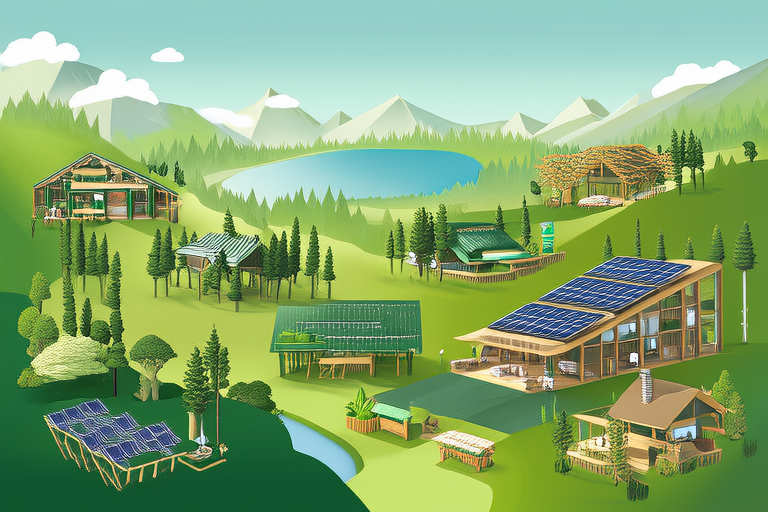Introduction: The Importance of Eco-Friendly Accommodations in Sustainable Tourism
Sustainable tourism is gaining momentum as travelers increasingly seek ways to minimize their environmental impact while exploring the world. One crucial aspect of sustainable travel is choosing eco-friendly accommodations. These establishments not only reduce their carbon footprint but also contribute positively to local communities and ecosystems. By opting for eco-friendly lodging, travelers can enjoy guilt-free vacations while supporting global efforts toward sustainability.
In this article, we will explore various types of eco-friendly accommodations available worldwide, discuss how they promote sustainable tourism, and provide practical tips on making informed choices when booking your next trip. Whether you’re a seasoned traveler or just starting out, understanding these options can help you make more responsible decisions during your travels.
Types of Eco-Friendly Accommodations
Green Hotels
Green hotels are designed with sustainability in mind, incorporating practices such as energy-efficient lighting, water conservation measures, and waste reduction strategies. Many green hotels also source locally grown foods and use organic products wherever possible. For example, some hotels may have rooftop gardens where guests can pick fresh herbs and vegetables for meals. When selecting a green hotel, look for certifications like LEED (Leadership in Energy and Environmental Design) or EarthCheck, which ensure adherence to strict environmental standards.
Eco-Lodges
Eco-lodges offer an even deeper connection with nature by integrating seamlessly into their surroundings. Often located in remote areas, these lodgings prioritize minimal disruption to natural habitats while providing comfortable stays for visitors. Many eco-lodges employ renewable energy sources such as solar panels or wind turbines to power their facilities. Additionally, they often support conservation projects within the region, helping protect endangered species and preserve biodiversity. Examples include treehouse accommodations in Costa Rica or tented camps in Kenya’s national parks.
Homestays
Homestays provide an authentic glimpse into local culture while minimizing the environmental impact associated with traditional tourism infrastructure. Staying with a host family allows travelers to experience daily life firsthand, fostering cross-cultural understanding and mutual respect. Hosts typically emphasize sustainability through practices like composting food waste, recycling materials, and using biodegradable cleaning supplies. This option is particularly popular among backpackers and those interested in immersive experiences abroad.
Practical Tips for Choosing Eco-Friendly Accommodations
Research Before Booking
Take time to research potential accommodations thoroughly before committing. Look for reviews from previous guests who mention specific green initiatives implemented by the establishment. Websites like TripAdvisor or Booking.com allow users to filter searches based on criteria such as “green” or “eco-friendly.”
Ask Questions
Don’t hesitate to ask questions directly to the accommodation provider about their sustainability policies. Inquire about any ongoing conservation efforts, community engagement programs, or partnerships with local organizations dedicated to preserving natural resources. Transparent communication demonstrates genuine commitment to sustainable practices.
Consider Location
Choosing a centrally located hotel or lodge reduces transportation emissions since it minimizes the need for frequent car trips between destinations. Opting for walking tours or public transport further decreases your carbon footprint. Moreover, staying close to attractions encourages exploration on foot, promoting physical activity and reducing reliance on fossil fuels.
Case Studies: Successful Eco-Tourism Initiatives
Costa Rica’s Treehouse Eco-Lodge
Costa Rica has become synonymous with eco-tourism due to its vast array of protected areas and commitment to preserving biodiversity. One notable example is the Treehouse Eco-Lodge, nestled deep within Manuel Antonio National Park. This unique accommodation offers guests the opportunity to sleep among towering trees while enjoying panoramic views of the rainforest canopy below. The lodge employs several innovative techniques to minimize its ecological footprint, including rainwater harvesting systems, solar-powered hot water heaters, and composting toilets. Furthermore, profits generated from visitor fees fund ongoing reforestation projects aimed at restoring degraded lands.
Bhutan’s Community-Based Tourism Programs
Bhutan stands out as one of the few countries actively promoting low-impact tourism through its “High Value, Low Impact” policy. Under this framework, community-based tourism initiatives empower rural villagers by generating income directly from tourists who wish to participate in traditional activities such as archery tournaments or yak herding expeditions. Participants stay overnight in simple guesthouses owned and operated by local families, ensuring that economic benefits remain within the community rather than being siphoned off by large corporations. Such grassroots approaches foster stronger bonds between visitors and hosts while safeguarding cultural heritage sites from overdevelopment.
Conclusion: Taking Action Towards Sustainable Travel
As responsible travelers, we have the power to shape the future of global tourism by supporting eco-friendly accommodations that prioritize sustainability. By choosing green hotels, eco-lodges, or homestays, we contribute positively to both environmental preservation and socioeconomic development. Remember to conduct thorough research, ask pertinent questions, and favor locations conducive to reduced emissions. Together, let us strive towards creating a more sustainable travel industry that respects our planet’s finite resources and honors diverse cultures around the world.
In summary, embracing eco-friendly accommodation choices is essential for advancing sustainable tourism worldwide. Not only do these establishments mitigate adverse effects on ecosystems, but they also enhance cultural exchange opportunities and stimulate economic growth among marginalized populations. As you plan your upcoming adventures, consider incorporating these principles into your itinerary to leave lasting positive impacts behind.
